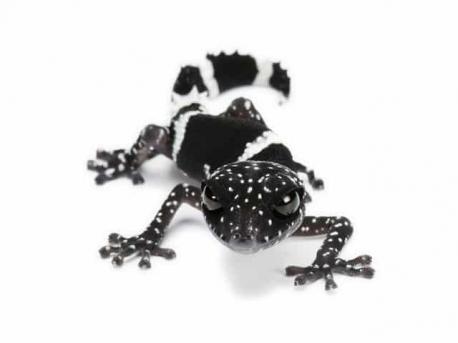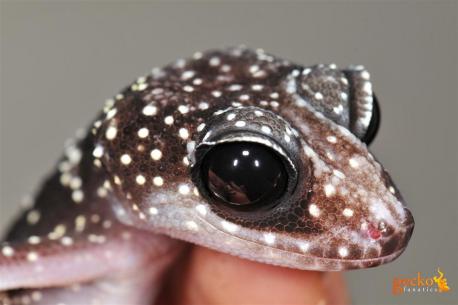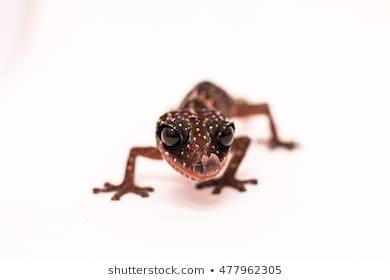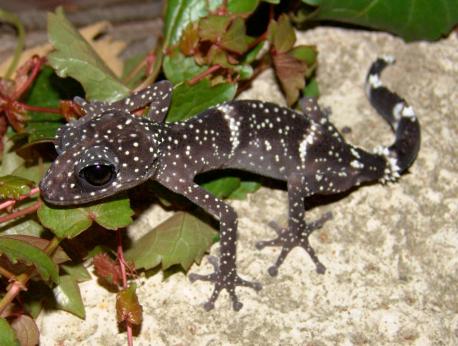Results: Masobe Gecko
Published on 04/21/2019
(Source: reptiletalk.net and easciences.org) Paroedura masobe is the biggest species of the genus Paroedura. They are noctural. Animals have unusual external view, with white-spotted dark skin and big eyes. No one subspecies of P. masobe is known.
Paroedura masobe is an interesting ground gecko species. It was described just in 1994, and it remains a jewel in herp collections to present day.
Scientific name : Paroedura masobe
Distribution : Madagascar (Zahamena-Nature Reserve)
Average Size : 0.16 m (0.5 ft)
Life Span : 8 years or more

QUESTIONS
GO to COMMENTS
Comments
1.
1.
For those who want to keep them as pets, they prefer live in a rainforest habitat with branches and cork bark tubes. Vivaria should be at least 0.45 meters (1.5 feet) tall for adults, (I use 0.45 x 0.45 x 0.45 meters (1.5 x 1.5 x 1.5 feet) or 0.45x 0.45 x 0.6 meters (1.5 x 1.5 x 2 feet) Exoterra terrariums). Hatchlings and juveniles can be kept in medium to large "critter keeper" type vivaria. A few live plants are recommended. A setup similar to those use for Uroplatus with the addition of hide spots will work well. Their hide box should have dark, humid hide spots should be provided. You can use black plastic ones and cover the entrance with a slanted piece or cork bark to keep out light. Substrate: Peat moss or coconut coir mixed with sand or similar forest type soil mixes. Do you think it is right to keep these creatures as pets?

Yes
7%
146 votes
No
71%
1503 votes
Undecided
22%
472 votes
2.
2.
Potential Health Problems: High temperatures and/or low humidity will stress these delicate animals and if prolonged will result in death. A diet consisting solely of crickets may cause nutritional deficiencies. Both wild-caught and captive-bred P. masobe should be treated with care, there is often little warning if one of these geckos is doing poorly, they can decline and pass away very quickly. That being said, acclimated animals can live and breed for several years. Do you consider it will be easy to take proper care of a gecko?

Yes
6%
125 votes
No
70%
1481 votes
Undecided
24%
515 votes
3.
3.
The Masobe gecko (Paroedura masobe) is a small, ground-dwelling reptile native only to Madagascar. The species first appeared on the IUCN Red List of Endangered Species in 2011. It is only known to inhabit two distribution sites. Populations can only be found between the elevations of 300 to 600 meters, with an extent of occurrence of 410 km². However, it is estimated that individuals truly only reside within an area of 100 km², referred to as the species' true distributional extent of occurrence. The Masobe gecko population is considered to be both decreasing and severely fragmented. The species itself is hard to find in the wild, partially because individuals are nocturnal. Although these small geckos are considered to be ground dwelling, they primarily reside on vegetation between 1 and 4 meters above the ground. Individuals can live up to 8 years or more. Considering that they are an endangered species, do you think that promoting having them as pets will help to keep the population stable and growing?

Yes
17%
369 votes
No
83%
1752 votes
4.
4.
The primary threats to the Masobe gecko include habitat fragmentation and degradation. Ongoing pressures on low elevation humid forests are a continued threat. These pressures include deforestation, conversion of rainforests into farmland, and extraction of natural resources, such as honey. The international pet trade also serves as a threat to the species. Unfortunately, there are few conservation plans in action for this beautiful species of gecko. More research is needed into population trends and species distribution. Fortunately, the Masobe gecko is found within two protected areas of Madagascar, Zahamena-Ankeniheny and Réserve Naturelle Intégrale de Betampona. The species needs a comprehensive conservation management plan, including strengthened habitat preservation and illegal trade enforcement. As for many other species, our progress means their end. Do you have any endangered species that you particularly care for where you live?

Yes
10%
209 votes
No
68%
1435 votes
Undecided
22%
477 votes
COMMENTS


